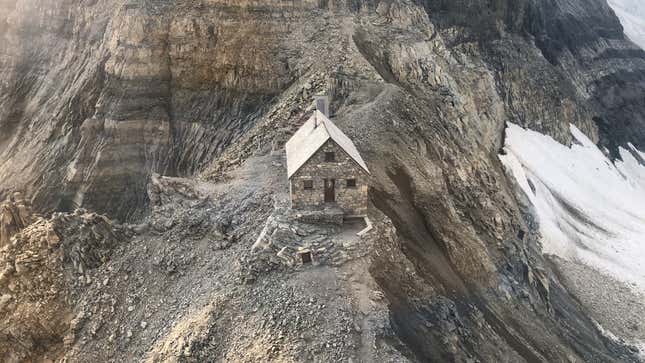
A historic cabin high up in Canada’s Yoho National Park is now slated for demolition, park officials said, because the rock and soil beneath it is eroding, putting the 100-year-old structure at risk of collapse.
The Abbot Pass Refuge Cabin is a national historic site that straddles the continental divide near Yoho National Park. At 9,600 feet above sea level, the shelter has long been a popular destination for hikers and a starting point for mountaineers looking to scale some of the nearby peaks, according to Parks Canada. Built in 1922, the cabin sits on a slope that was once covered in a permanent snow and ice layer, which kept the soil and rock below in place. But the snow and ice is no longer permanent, and in recent years the cabin’s southeastern slope has noticeably eroded.

The cabin was closed to visitors in 2018 and work began on the structure’s preservation; Parks Canada poured over $600,000 into installing rock anchors beneath the hut. But the next year, work stalled due to bad weather, and in 2020 the covid-19 pandemic further delayed proceedings. Last year, the erosion worsened, with over 4,000 cubic feet of material falling down the slopes under the cabin. That prompted park officials to decide to take apart the structure altogether, for safety reasons.
“We’re definitely saddened by the loss of this Alpine refuge due to the effects of climate change,” Alex Kolesch, a senior advisor with Parks Canada, told Inside Climate News. “We look forward to exploring ways to continue to commemorate this important part of Canada’s heritage and this national historic site.”
Erosion is a major threat to archaeological sites, though sometimes climate change can cause some cultural heritage to reappear, even if briefly. Especially in regions historically covered by ice, ancient artifacts preserved by frozen soil can emerge after centuries, and if they’re not recovered quickly, they can deteriorate.
Parks Canada considered deconstructing the building in a way that would allow it to be rebuilt on a different location, but decided against it for the safety of its workers, and based on the consultation of experts who said that the hut’s limestone would likely fracture if moved.
Though the hut will be wiped from its mountain perch, Parks Canada captured 3D images of the shelter last year, Inside Climate News reported, so the century-old structure can live on digitally.
Site: Scientists Find Mammoth Seemingly Butchered by Humans on Arctic Island